Guide
10 Things Every Parent Caregiver Wishes You Knew
What Parent Caregivers Don’t Always Say Out Loud
Parent caregivers often carry a heavy load, navigating systems, advocating for their child, and managing daily life with little recognition or support. In the midst of it all, they may not have the time, energy, or space to explain what they truly need from the people around them.
If you want to support a caregiver in your life or organization, these are powerful insights from caregivers that can help you understand what really matters and how to show up in meaningful ways.
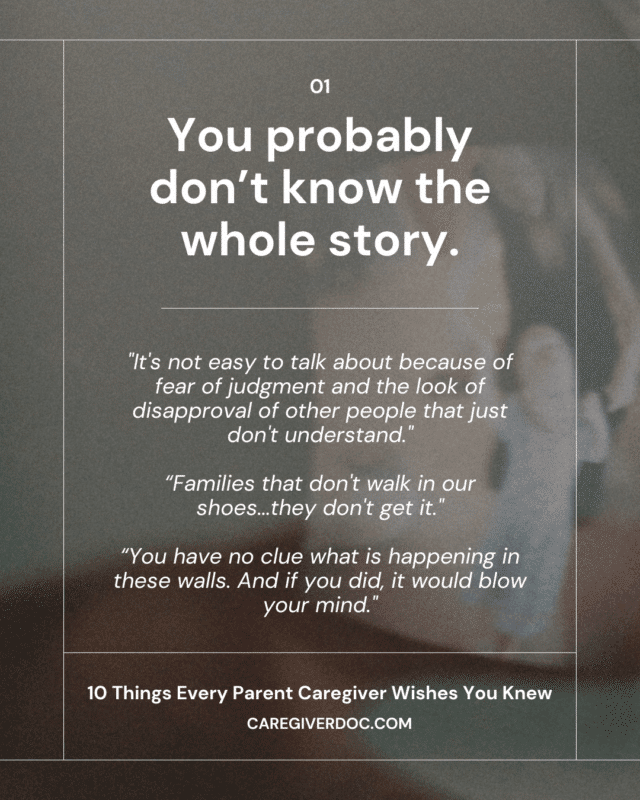
1. You probably don’t know the whole story.
Unless you’ve lived it, you likely don’t see the emotional, physical, financial and logistical challenges of caregiving happening behind closed doors.
You might see a family in public and feel tempted to judge how they’re handling a situation, but keep in mind that there are inevitably many factors at play that you don’t understand.
“It’s not easy to talk about because of fear of judgment and the look of disapproval of other people that just don’t understand.”
“Families that don’t walk in our shoes… they don’t get it.”
“You have no clue what is happening in these walls. And if you did, it would blow your mind.”
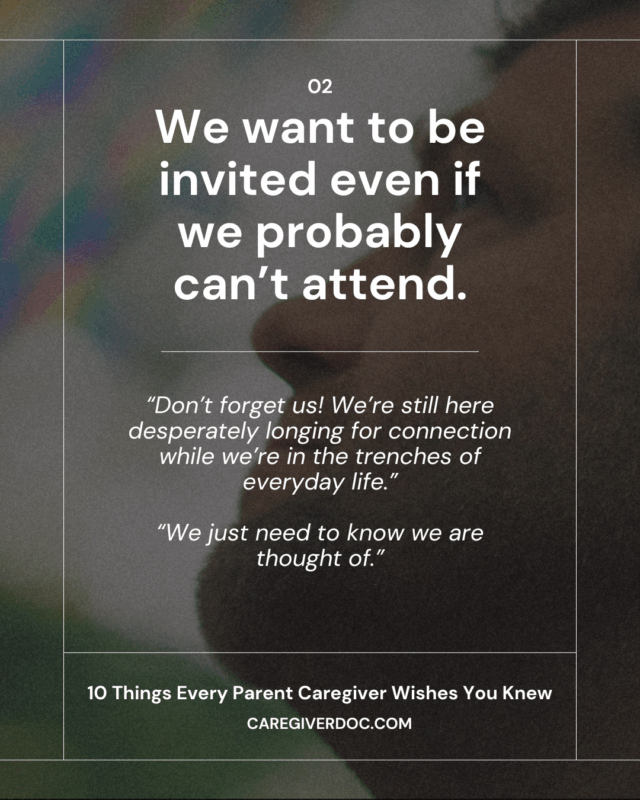
2. We want to be invited even if we probably can’t attend.
Caregivers may have to say no often due to the challenges and unpredictability of caregiver, but being included still matters. Invitations are a simple but powerful reminder that they’re not forgotten.
“Don’t forget us! We’re still here desperately longing for connection while we’re in the trenches of everyday life.”
“We just need to know we are thought of.”
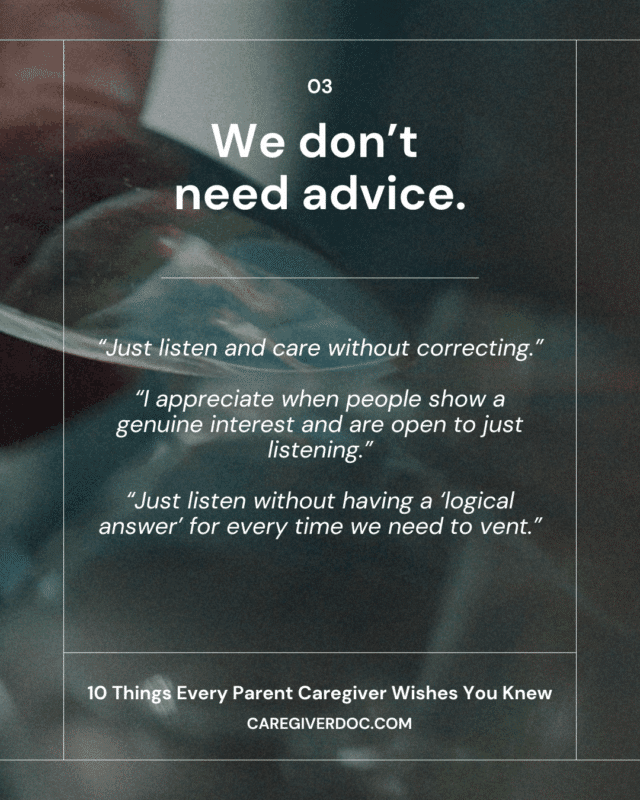
3. We don’t need advice.
Sometimes caregivers just need someone to listen without judgment or solutions. Offering advice can make caregivers feel misunderstood or dismissed, while empathy helps them feel supported and heard.
“Just listen and care without correcting.”
“I appreciate when people show a genuine interest and are open to just listening.”
“Just listen without having a ‘logical answer’ for every time we need to vent.”
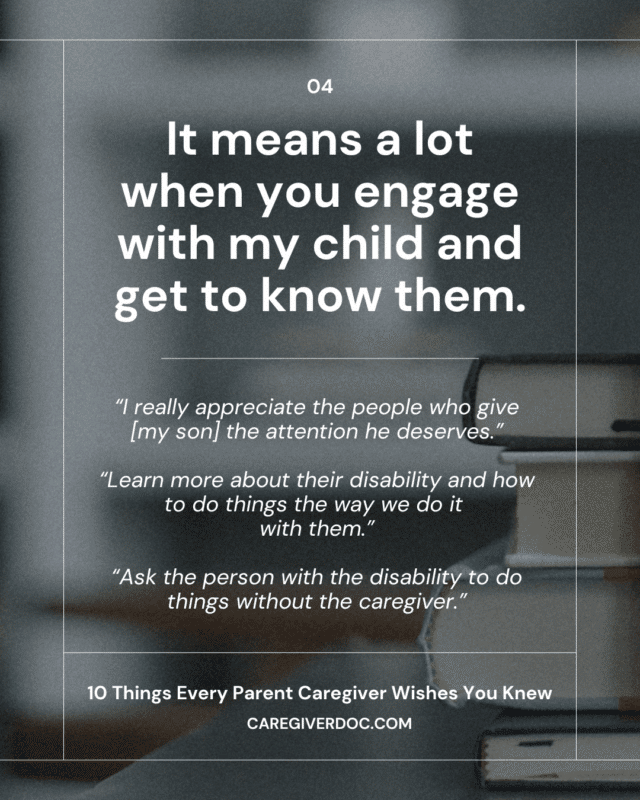
4. It means a lot when you engage with my child and get to know them.
Caregivers notice when others take the time to truly connect with their disabled child. Showing genuine interest, learning how to interact in ways that work for that person, and including them directly helps families feel accepted and valued.
“I really appreciate the people who give [my son] the attention he deserves.”
“Learn more about their disability and how to do things the way we do it with them.”
“Ask the person with the disability to do things without the caregiver.”
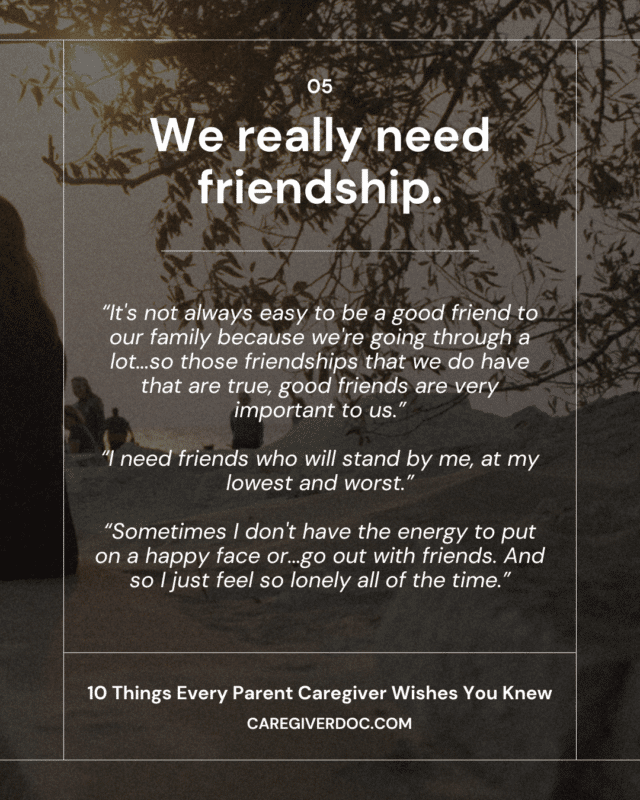
5. We really need friendship.
Genuine friendship is lifeline-level support for caregivers. Even when they can’t show up socially, your consistent presence matters deeply.
“It’s not always easy to be a good friend to our family because we’re going through a lot… so those friendships that we do have that are true, good friends are very important to us.”
“I need friends who will stand by me, at my lowest and worst.”
“Sometimes I don’t have the energy to put on a happy face or…go out with friends. And so I just feel so lonely all of the time.”
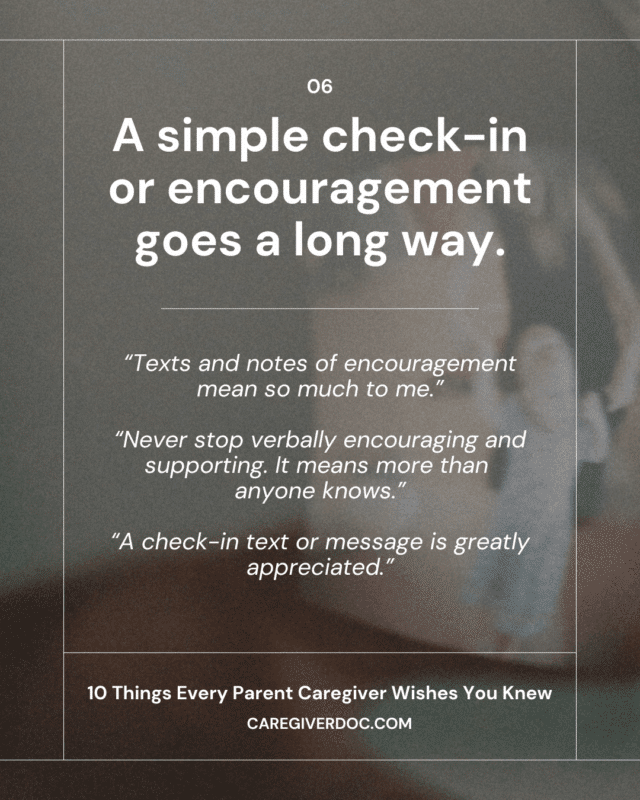
6. A simple check-in or encouragement goes a long way.
Small gestures like a quick message or kind word can make a huge emotional impact. Caregivers often feel isolated and need reminders that they’re seen and appreciated.
“Texts and notes of encouragement mean so much to me.”
“Never stop verbally encouraging and supporting. It means more than anyone knows.”
“A check-in text or message is greatly appreciated.”
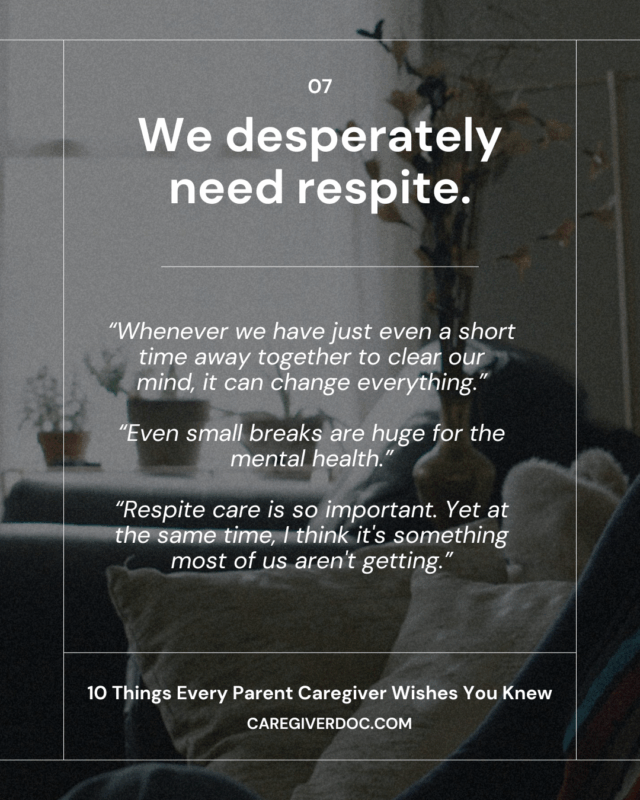
7. We desperately need respite.
Time to rest and recharge is essential, but hard (or even nearly impossible) to access for caregivers. Even short breaks can dramatically improve a caregiver’s mental health and ability to keep going.
“Whenever we have just even a short time away together to clear our mind, it can change everything.”
“Even small breaks are huge for the mental health.”
“Respite care is so important. Yet at the same time, I think it’s something most of us aren’t getting.”
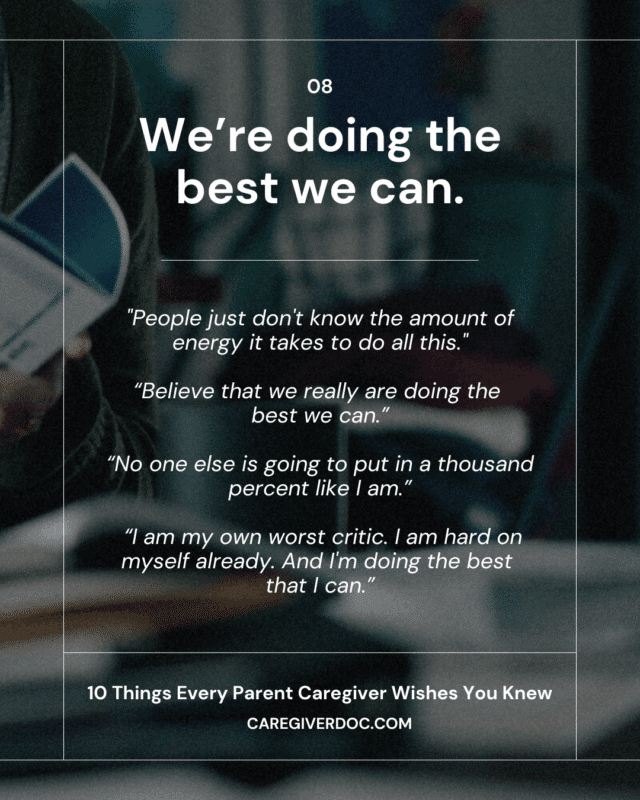
8. We’re doing the best we can.
Time to rest and recharge is essential, but hard (or even nearly impossible) to access for caregivers. Even short breaks can dramatically improve a caregiver’s mental health and ability to keep going.
“People just don’t know the amount of energy it takes to do all this.”
“Believe that we really are doing the best we can.”
“No one else is going to put in a thousand percent like I am.”
“I am my own worst critic. I am hard on myself already. And I’m doing the best that I can.”
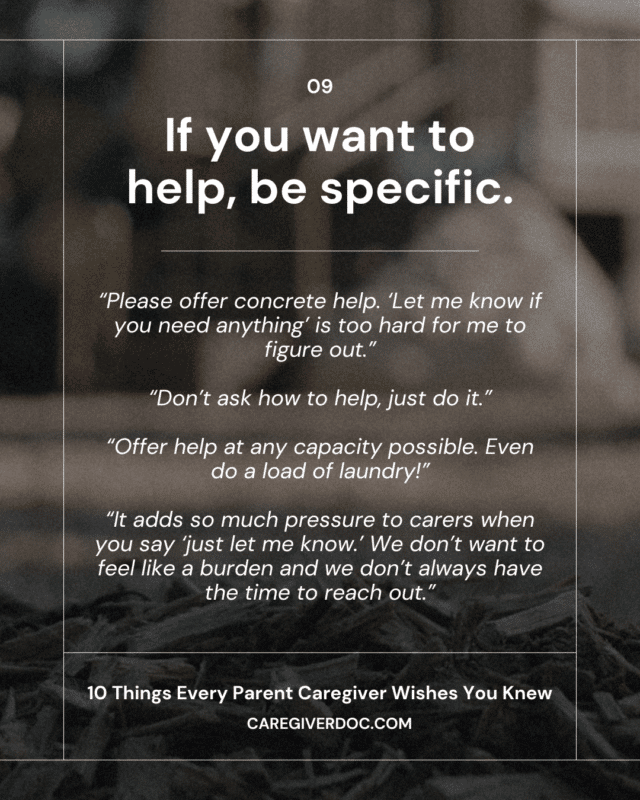
9. If you want to help, be specific.
Vague offers to help can unintentionally add stress. Instead, offer something specific and actionable. It removes the burden of asking and shows you mean it.
“Please offer concrete help. ‘Let me know if you need anything’ is too hard for me to figure out.”
“Don’t ask how to help, just do it.”
“Offer help at any capacity possible. Even do a load of laundry!”
“It adds so much pressure to carers when you say ‘just let me know.’ We don’t want to feel like a burden and we don’t always have the time to reach out.”
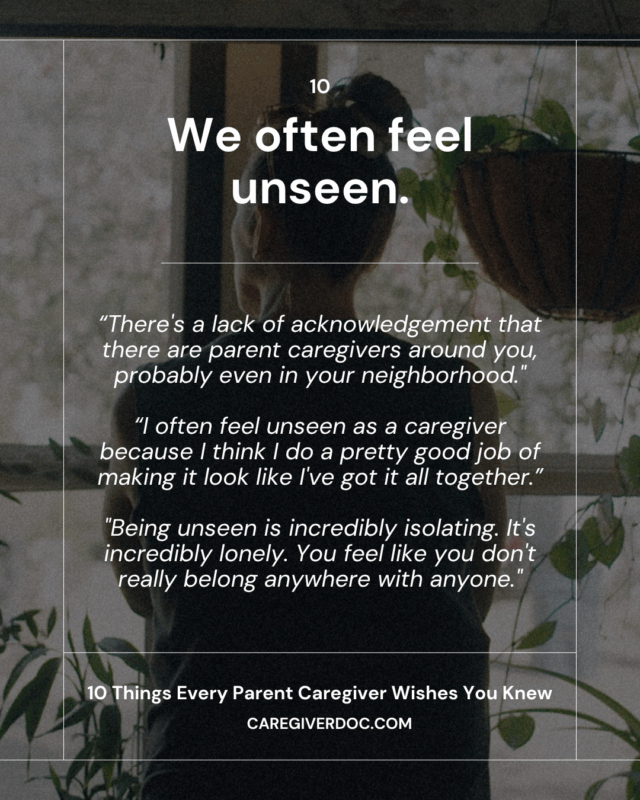
10. We often feel unseen.
Many parent caregivers feel unseen. The work of caregiving is largely hidden, and caregivers may hesitate to share their challenges out of fear of judgment or misunderstanding. And even when they want to be part of the community, physical spaces, programs, and social environments often aren’t accessible or inclusive, making it even harder to be seen, understood, and supported.
“There’s a lack of acknowledgement that there are parent caregivers around you, probably even in your neighborhood.”
“I often feel unseen as a caregiver because I think I do a pretty good job of making it look like I’ve got it all together.”
“Being unseen is incredibly isolating. It’s incredibly lonely. You feel like you don’t really belong anywhere with anyone.”
Go Behind the Scenes with Real Caregivers
Watch the documentary UNSEEN: How We’re Failing Parent Caregivers & Why It Matters to hear parent caregiver stories firsthand. This powerful documentary sheds light on the invisible work, emotional and physical toll, and urgent need for more support.
Learn more about how you can help caregivers, and explore all of our resources for caregivers and advocates.

